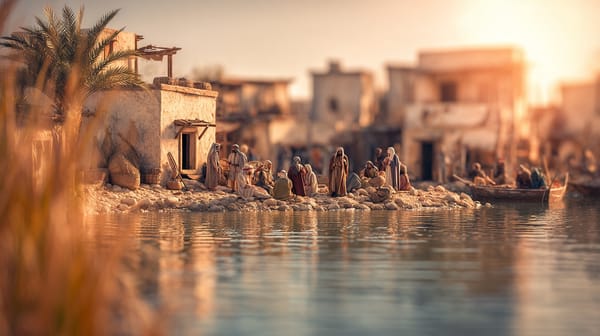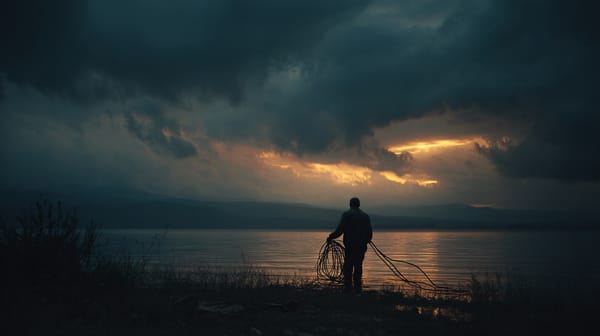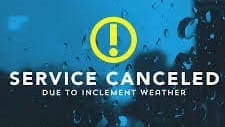Fairhaven Sermon 7-6-2025

Summary
In this week’s service, Rev. Peg Bowman reflected on her recent trip to England and France, sharing impressions from her time at Oxford and her visits to London and Paris. She highlighted the importance of kindness from strangers, sharing several heartwarming anecdotes from her travels – a waiter sharing a special dish in London, a fellow attendee providing service details for Notre Dame in Paris, and even joining a group singing "Happy Birthday" in a London elevator. These experiences underscored the profound impact of simple acts of generosity and the power of connection, particularly when encountering those outside one's familiar circles.
Drawing a connection to today’s Gospel reading about Jesus sending out his disciples, Rev. Peg emphasized the importance of embodying that same spirit of welcoming and providing for strangers. She encouraged the congregation to be mindful of opportunities to show small kindnesses, recognizing that these acts, however seemingly insignificant, reflect God’s love and contribute to a more connected and compassionate community. The overarching theme was about recognizing and reciprocating the kindness we experience and extending it to others, mirroring God’s own graciousness and creating a more welcoming world.
Transcript
So good morning. Yes, I am back as of this last Thursday night and it's good to be back. And I thank you all so much for helping to make this trip possible and for encouraging me on this opportunity to study at Oxford for a week. The course I attended Let's just say both my mind and my heart are full right now and I am still processing.
So I will share a few impressions this morning, but there will be more to come in the weeks and the months ahead. So to kind of summarize where I've been and what I've been doing, I was overseas for just a little bit over two weeks. and the seminar I attended was a week long, so I arrived in England four days early and left four days afterwards. During the four days before the seminar, I was in London, mostly visiting churches, including the Methodist Central Hall.
And I was hoping to meet some of the people who work at the Central Hall and find out more about how they serve the people of London, but unfortunately that wasn't possible and I probably should have tried to make arrangements for that before I left the States. But I learned a little bit about the Hall. The Methodist Central Hall, which is literally right across the street from Westminster Abbey, is a working church. but it also doubles as a venue for concerts and plays and meetings.
So most of it's not open to the public most of the time. The one part of the hall that is open and that I was able to visit was their cafe, which is currently in the basement while the street cafe is being remodeled. The cafe offers coffees and teas and homemade pastries, a sandwich bar, a soup bar, basically a place to have breakfast or lunch if you're looking for a pleasant and reasonably priced place to sit down and have a meal in London, which can be difficult to do. So it was cool to see all the people from all over the world speaking so many languages and coming to this place to share food and fellowship really was an oasis in the center of the city.
So visiting churches took up most of my first four days. Thank you. By the way, I was also, I stopped by for a service at St. Paul's Cathedral and I noticed the statue of John Wesley below the main doors had a bouquet of flowers that had been left at the feet of the statue.
It had been some time, it hadn't been removed, and I just thought that was cool. So there we are. And then the four days after the seminar, well, one day I used for shopping, 'cause when you're in Europe, you have to shop, right? But the highlight of the last four days was an overnight trip to Paris, traveling by train. The journey is just over two hours from London.
I had no idea it was so close and so quick. And I had been wanting to see Notre Dame again after that horrible fire. because I'd been there once in high school and you know that feeling you get when an old friend has been ill and that desire to be there and see how they're doing. I needed to visit an old friend, you know.
So I'm thrilled to say the cathedral is completely open. It is gorgeous. Work still continues on the outside of the building, but the interior is finished. It is stunning.
Both of the rose windows survived. So did most of the artwork. All these things have been cleaned and restored. It looks beautiful.
So I attended a service at five in the afternoon there, which of course was a Catholic service in Latin. and the service sheets were translated into French. So I was confused in two languages at once, right? I got the general idea. And I'll have photos to share as soon as I can get them all organized.
Meanwhile, the highlight of the trip, the whole purpose, the seminar at Oxford, offered a week's teaching on the subject of the creation. And when I signed up for this, I thought, wrongly, that this would be a week spent digging deep into Genesis, right? I mean, because we did study Genesis, but the speakers who came from around the world also shared about other aspects of creation, right? Things like what the Apostle Paul teaches about creation in his letters, what Isaiah has to say about creation, what Scripture tells us about our relationship with God's creation, how do we work well with this creation that God has given us to tend? How do we pray for creation? How do other cultures, such as our African brothers and sisters, relate to creation? The teachings and the conversations were both deep and wide, and I hope to share highlights with you over the coming months. For today, though, I wanted to share something a little bit more personal, and something that ties in with today's scripture reading, today's gospel reading. The scripture for today in the Gospel of Luke talks about a time when Jesus sent the disciples out two by two to villages and towns that they hadn't visited before to share the good news of the gospel and to heal the sick.
And the purpose of the mission trip was to prepare the way for the Lord, to get people ready to know Jesus, to receive God's truth, and to know God's love. And this is still our mission today, maybe not quite in the same way, but as Christian believers, our mission is to share the good news of Jesus and to bring healing into a world where people are hurting and to prepare the way for the Lord's return. The first thing I notice in this scripture passage is what the disciples took with them. Speaking as someone who just came home from a long journey, I was amazed by what the disciples didn't have.
They had no suitcases, no backpacks. As Jesus says, no purse, that is no money, no changes of clothing, no extra sandals, no provisions at all. And the disciples are traveling to places they've never been for. So for me, this past trip, it was to places I'd been before.
So I knew where to go, what to do, how to relate to the local culture. The disciples knew none of these things. They had to rely completely and totally on the kindness and generosity of strangers. Now in the law of Moses, God says to God's people, this is in Deuteronomy chapter 10, the Lord your God is the God of gods and the Lord of lords, the great God, mighty and awesome, who is not partial, takes no bribe, who executes justice and For the orphan and the widow, and who loves the strangers, providing them food and clothing, you shall also love the stranger, for you were strangers in the land of Egypt.
In the days of Jesus... This law of Moses was still in effect and very much expected.
This was expected behavior, caring for strangers, in this case, caring for the disciples. Men who were not foreigners, they came from the same country, but they came from distant cities and they didn't know anyone in town. So they were complete strangers to the people there. And the disciples came with an unusual message.
The kingdom of God is near. Their mission was almost, not quite, but almost, a litmus test to see if the people of that town would obey the law of Moses. And, of course, the disciples were depending on the people being faithful and generous because they had nothing, nothing to offer but the gospel. Jesus told them that if a village refused to offer them food and a place to stay, that they should shake the dust off their feet as they left, off their sandals, and woe to that city.
The kindness of strangers means a great deal to a person who is traveling. this And that's the number one thing I took away from this journey. The kindness of strangers makes all the difference in the world. As a traveler, just a few examples, as a traveler, one of my greatest daily concerns was staying hydrated.
I know, I mean, you don't have a kitchen to go to, right? I noticed that in large cities like London and Paris, where there are a lot of visitors. Bottled water is on sale almost every street corner, and it is so needed, especially this summer when temperatures have been in the 90s in London and over 100 in Paris, which is extremely unusual for both cities. People who come in frequent contact with travelers are profoundly aware of our need for water, and they help supply it. Kindness to strangers unlooked for and unasked for is a God thing in very practical ways.
And I wanted to share a few of these stories with you about people I met, just modern day stories of people caring for a stranger. The first story happened when I was eating dinner at a neighborhood Chinese restaurant in London. This restaurant was near my hotel. It became one of my favorite places to eat while I was there.
It was real Chinese, man. There's quite a few Chinese families in the neighborhood. And more often than not, when I was there, I heard a lot of languages other than English being spoken. One night as I was waiting for my dinner, the waiter came to the table next to mine where a Chinese woman and her daughter were sitting, and he did this presentation, right? He's like scooping food, like, you know, all this, and laying greens, and it's just gorgeous, gorgeous.
And, And when he was done, I asked him quietly, What did you just serve? I've never seen anything like it. And the mother overheard my question, and switching into perfect English, she said, Hand me your bread plate, and let me give you some. There's way too much here for us. And she scooped out onto my plate what I discovered was lobster and noodles.
It was good. The kindness of a stranger, you know. Another kindness happened when I was at Oxford. One of my fellow seminar attendees was from France, and when he heard about my plans to visit Notre Dame, and that I was hoping to attend a service on Monday afternoon, that being the only day I could be there.
He logged onto Notre Dame's website, which of course is in French, found the times of the services for Monday, and then held up his cell phone and said, Take a picture of my phone, so I'd have a copy of the service schedule. That photo became my guide while I was there. Again, kindness of stranger. The third story was one I had a hand in.
And this one happened in London on a Friday afternoon rush hour. I was taking the subway back to my hotel, the underground as they call it, London's subway system, which is an engineering marvel. I could go on and on. The place amazes me.
So I just wander around looking at it. The train platforms there are so deep down that they were used as bomb shelters during World War II. And because of this, people often need to take elevators to get up and down from the trains. So here we were, a whole bunch of people at rush hour, waiting for an elevator.
And I noticed a group of young women in their late teens or early 20s up front by the elevator door, laughing and giggling and chatting. And one of them was wearing a tiara that said, 'Happy Birthday.' And the elevator we got into, of course, is a little bit bigger than you normally find like in a hotel. It's more like a cattle car.
You enter from the back exit to the front. And so the young ladies got on first and they were up towards the front and I was the last one to squeeze into the back. And the doors shut. And of course, as in elevators everywhere, when the door closes, conversation stops.
At which point I called out from the back, so are we going to sing happy birthday or what? And the girls up front busted out laughing. And one of them says, great idea, and starts to sing. And so on that Friday night, an elevator packed full of people started their weekend by singing happy birthday to a total stranger. Small kindnesses.
light up the whole day. And I believe that's how God meant us to live, in our communities, in our city, in the places we visit. These are examples of what Moses meant But..
. when he said, Welcome the stranger. And that's what Jesus was looking for when he sent his disciples out two by two. Small kindnesses that draw us together, help us enjoy being human, help us to become more the people God created us to be.
So I just want to leave this suggestion with you today. Keep eyes open in the next few weeks. Watch for ways to share small kindnesses with strangers, and be aware of kindnesses that others do for us. The world we live in can feel like a very dark place sometimes, a very lonely place.
And this is one way that we can shine God's light into dark places. And if you happen to experience someone sharing a small kindness over the next few weeks, Please tell me about it. Tell other people too, but tell me about it so we can talk about these things. These events might sound like they're small and insignificant, but in a very real and powerful way.
They remake us into the image of God, a God who shows us small kindnesses every day of our lives. It's our way of becoming more like the Lord that we love. Amen.



